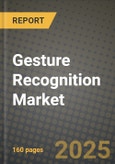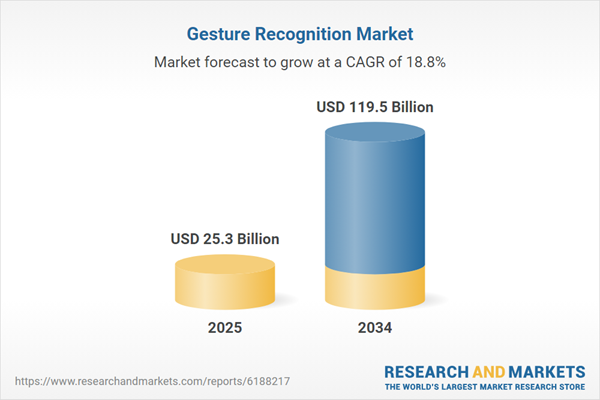The gesture recognition market is witnessing rapid growth as touchless interfaces become an integral part of digital interactions across industries. Leveraging AI, computer vision, and sensor technologies, gesture recognition enables users to control devices and systems with intuitive hand or body movements, eliminating the need for physical contact. The demand for gesture-based interfaces is surging due to their applications in automotive, consumer electronics, healthcare, and industrial automation. The rise of augmented reality (AR) and virtual reality (VR) experiences is further fueling the adoption of gesture control systems. Additionally, the increasing focus on hygiene and contactless solutions post-pandemic has reinforced the necessity of gesture recognition in public and commercial environments. As companies continue to refine their AI algorithms and sensor accuracy, the market is poised for substantial growth in the coming years.
The gesture recognition market experienced significant advancements driven by improvements in AI-powered gesture tracking and machine learning algorithms. The automotive sector saw a notable expansion of gesture control features in infotainment systems, enhancing driver safety and convenience. Consumer electronics manufacturers integrated gesture recognition into smart TVs, gaming consoles, and wearables, offering more immersive user experiences. Additionally, healthcare applications expanded, with gesture-based controls being implemented in surgical rooms and rehabilitation therapies. AI-powered gesture control solutions gained traction in industrial automation, enabling workers to operate machinery more efficiently without physical contact. Regulatory support for advanced human-machine interfaces further boosted market adoption. The growing integration of LiDAR, ultrasound sensors, and 3D cameras enhanced gesture recognition accuracy, making systems more responsive and intuitive.
The gesture recognition market is expected to witness further evolution with the development of AI-enhanced deep-learning models that improve gesture accuracy and contextual understanding. The expansion of mixed reality applications, particularly in gaming, training, and remote collaboration, will drive demand for advanced gesture control interfaces. The automotive industry is likely to integrate gesture recognition more extensively in autonomous vehicles, enabling seamless human-machine interaction. Additionally, smart home ecosystems will leverage gesture-based controls for home automation, making interactions more natural and intuitive. The growing adoption of edge computing and 5G technology will also contribute to faster and more efficient processing of gesture commands. However, data privacy concerns and security risks associated with AI-driven gesture recognition remain a challenge, requiring companies to implement robust encryption and security frameworks. With continuous technological advancements, the gesture recognition market is set to become an essential component of future human-computer interactions.
Key Insights: Gesture Recognition Market
- AI-Driven Gesture Recognition: Advances in deep learning and AI-powered models are enhancing gesture recognition accuracy, making interactions more seamless across industries.
- Integration with AR and VR: Gesture-based controls are becoming a crucial component of AR and VR applications, improving user immersion in gaming, training, and simulation environments.
- Automotive Gesture Control Expansion: The automotive industry is increasingly adopting gesture recognition for infotainment, navigation, and driver assistance systems, improving safety and convenience.
- Smart Home and IoT Adoption: Gesture-controlled home automation is gaining traction, enabling users to interact with smart devices through natural hand movements.
- Edge Computing for Faster Processing: The rise of edge AI processing is reducing latency in gesture recognition systems, enabling real-time responsiveness for critical applications.
- Growing Demand for Contactless Interfaces: Increasing concerns over hygiene and convenience are accelerating the adoption of touch-free gesture recognition systems across public and commercial spaces.
- Rising Adoption in Consumer Electronics: Smartphones, smart TVs, gaming consoles, and wearables are incorporating gesture-based controls to enhance user engagement and accessibility.
- Advancements in Sensor Technologies: The integration of LiDAR, 3D cameras, and ultrasonic sensors is improving the precision and responsiveness of gesture recognition systems.
- Increased Investment in AI and Machine Learning: Ongoing AI research and development efforts are enabling more intuitive and adaptive gesture recognition solutions across industries.
- Data Privacy and Security Risks: The collection and processing of gesture data raise concerns about user privacy, requiring stringent encryption protocols and regulatory compliance to ensure secure implementation.
Gesture Recognition Market Segmentation
By Type
- Online Gesture
- Offline Gesture
By Technology
- Touch-Based
- Touchless
By Authentication Type
- Finger Print Recognition
- Face Recognition
- Vision and IRIS Recognition
- Hand and Leg Recognition
By Industry
- Automotive
- Consumer Electronics
- Sports
- Healthcare
- Advertisement and Communication
- Aerospace and Defense
- Government
- Other Industries
Key Companies Analysed
- Apple Inc.
- SALTO Systems S. L.
- Intel Corporation
- Microchip Technology Inc.
- Qualcomm Technologies Inc.
- Synaptics Inc.
- Google LLC
- GestureTek
- IrisGuard UK Ltd.
- PointGrab Ltd.
- Cipla Limited
- HID Global
- Ultraleap Ltd.
- iProov Limited
- Oblong Inc.
- Sony Corporation
- EyeSight Technologies
- Omron Corporation
- Elliptic Labs
- GestureTek
- Crunchfish AB
- XYZ Interactive Technologies Inc.
- GestureTek Health
- Ultraleap
- Pebbles Interfaces
- PointGrab Ltd.
- Vayyar Imaging Ltd.
- Cognitec Systems GmbH
- Intel RealSense Technology
- Synaptics Incorporated
- Gestoos
- Gestigon GmbH
- OMRON Electronics
- pmdtechnologies ag
Gesture Recognition Market Analytics
The report employs rigorous tools, including Porter’s Five Forces, value chain mapping, and scenario-based modeling, to assess supply-demand dynamics. Cross-sector influences from parent, derived, and substitute markets are evaluated to identify risks and opportunities. Trade and pricing analytics provide an up-to-date view of international flows, including leading exporters, importers, and regional price trends.Macroeconomic indicators, policy frameworks such as carbon pricing and energy security strategies, and evolving consumer behavior are considered in forecasting scenarios. Recent deal flows, partnerships, and technology innovations are incorporated to assess their impact on future market performance.
Gesture Recognition Market Competitive Intelligence
The competitive landscape is mapped through proprietary frameworks, profiling leading companies with details on business models, product portfolios, financial performance, and strategic initiatives. Key developments such as mergers & acquisitions, technology collaborations, investment inflows, and regional expansions are analyzed for their competitive impact. The report also identifies emerging players and innovative startups contributing to market disruption.Regional insights highlight the most promising investment destinations, regulatory landscapes, and evolving partnerships across energy and industrial corridors.
Countries Covered
- North America - Gesture Recognition market data and outlook to 2034
- United States
- Canada
- Mexico
- Europe - Gesture Recognition market data and outlook to 2034
- Germany
- United Kingdom
- France
- Italy
- Spain
- BeNeLux
- Russia
- Sweden
- Asia-Pacific - Gesture Recognition market data and outlook to 2034
- China
- Japan
- India
- South Korea
- Australia
- Indonesia
- Malaysia
- Vietnam
- Middle East and Africa - Gesture Recognition market data and outlook to 2034
- Saudi Arabia
- South Africa
- Iran
- UAE
- Egypt
- South and Central America - Gesture Recognition market data and outlook to 2034
- Brazil
- Argentina
- Chile
- Peru
Research Methodology
This study combines primary inputs from industry experts across the Gesture Recognition value chain with secondary data from associations, government publications, trade databases, and company disclosures. Proprietary modeling techniques, including data triangulation, statistical correlation, and scenario planning, are applied to deliver reliable market sizing and forecasting.Key Questions Addressed
- What is the current and forecast market size of the Gesture Recognition industry at global, regional, and country levels?
- Which types, applications, and technologies present the highest growth potential?
- How are supply chains adapting to geopolitical and economic shocks?
- What role do policy frameworks, trade flows, and sustainability targets play in shaping demand?
- Who are the leading players, and how are their strategies evolving in the face of global uncertainty?
- Which regional “hotspots” and customer segments will outpace the market, and what go-to-market and partnership models best support entry and expansion?
- Where are the most investable opportunities - across technology roadmaps, sustainability-linked innovation, and M&A - and what is the best segment to invest over the next 3-5 years?
Your Key Takeaways from the Gesture Recognition Market Report
- Global Gesture Recognition market size and growth projections (CAGR), 2024-2034
- Impact of Russia-Ukraine, Israel-Palestine, and Hamas conflicts on Gesture Recognition trade, costs, and supply chains
- Gesture Recognition market size, share, and outlook across 5 regions and 27 countries, 2023-2034
- Gesture Recognition market size, CAGR, and market share of key products, applications, and end-user verticals, 2023-2034
- Short- and long-term Gesture Recognition market trends, drivers, restraints, and opportunities
- Porter’s Five Forces analysis, technological developments, and Gesture Recognition supply chain analysis
- Gesture Recognition trade analysis, Gesture Recognition market price analysis, and Gesture Recognition supply/demand dynamics
- Profiles of 5 leading companies - overview, key strategies, financials, and products
- Latest Gesture Recognition market news and developments
Additional Support
With the purchase of this report, you will receive:- An updated PDF report and an MS Excel data workbook containing all market tables and figures for easy analysis.
- 7-day post-sale analyst support for clarifications and in-scope supplementary data, ensuring the deliverable aligns precisely with your requirements.
- Complimentary report update to incorporate the latest available data and the impact of recent market developments.
This product will be delivered within 1-3 business days.
Table of Contents
Companies Mentioned
- Apple Inc.
- SALTO Systems S. L.
- Intel Corporation
- Microchip Technology Inc.
- Qualcomm Technologies Inc.
- Synaptics Inc.
- Google LLC
- GestureTek
- IrisGuard UK Ltd.
- PointGrab Ltd.
- Cipla Limited
- HID Global
- Ultraleap Ltd.
- iProov Limited
- Oblong Inc.
- Sony Corporation
- EyeSight Technologies
- Omron Corporation
- Elliptic Labs
- GestureTek
- Crunchfish AB
- XYZ Interactive Technologies Inc.
- GestureTek Health
- Ultraleap
- Pebbles Interfaces
- PointGrab Ltd.
- Vayyar Imaging Ltd.
- Cognitec Systems GmbH
- Intel RealSense Technology
- Synaptics Incorporated
- Gestoos
- Gestigon GmbH
- OMRON Electronics
- pmdtechnologies ag
Table Information
| Report Attribute | Details |
|---|---|
| No. of Pages | 160 |
| Published | October 2025 |
| Forecast Period | 2025 - 2034 |
| Estimated Market Value ( USD | $ 25.3 Billion |
| Forecasted Market Value ( USD | $ 119.5 Billion |
| Compound Annual Growth Rate | 18.8% |
| Regions Covered | Global |
| No. of Companies Mentioned | 34 |









